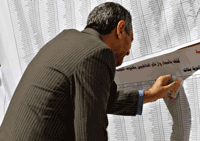
Egypt traders doubt election will end woes
Cairo, May 24, 2012
Foreign investors sold Egyptian stocks ahead of the first stage of presidential elections this week and are likely to remain cautious as traders doubt a new leader will be able to ease the country's political and economic woes.
All candidates in the vote are promising more equal distribution of wealth, less corruption, better education and big industrial projects to boost the ailing economy after 15 months of military rule. Final results are due on June 21 and with no reliable opinion polls, no one knows who will win.
Investors fearing a new bout of political turmoil are uneasy over the line-up of top candidates - ranging from old-school army man Ahmed Shafiq, who is hated by the young revolutionaries who led the campaign to topple President Hosni Mubarak, to the Muslim Brotherhood's Mohamed Mursi and leftist Hamdeen Sabahy.
Whoever eventually wins office will not know his ultimate powers because a new constitution has been delayed and faces an uphill struggle to head off a balance of payments crisis and rein in an unsustainable budget deficit.
'The market is not particularly enthusiastic about any of the candidates,' said Omar Darwish of brokerage CIBC in Cairo.
'We've been seeing foreigners selling and don't think that will change instantly with the decision on a new president.'
The Egyptian benchmark index has tumbled from its 2012 peak reached on March 7 as foreign reserves fell to levels seen by economists as dangerously low and the interim government struggled to secure emergency foreign funds.
The index is still up by about a third this year, after losing half its value in 2011, on hopes the military rulers can steer the country to stable civilian rule.
Darwish said the market got a brief fillip from economic growth figures that showed recovery from the worst point in the economy's post-uprising downturn and from the government's success in securing funds from donor Saudi Arabia.
'I think we'll have a bit more volume in the market next week which will give some support, but I don't see a really big rebound,' said Darwish.
The Egyptian market could also get a boost if mobile phone company Mobinil - the subject of a buyout tender from France Telecom that concludes this week - drops out of international benchmark indexes, encouraging institutional investors who track the benchmarks to switch funds into other local stocks.
Gulf Arab markets are likely to remain subdued after recent tumbles that were sparked by heavy falls on world bourses.
A lack of local news - a long-running lament of traders - means global sentiment will still be the main driver for Gulf stocks and with Europe's debt crisis unlikely to be resolved soon, that could spell more gloom for investors in these long-only markets.
Saudi Arabia's benchmark surged 31 per cent from late November to early April, but has since fallen 10 per cent and slumped to a three-month low on Saturday.
Expectations the Saudi stock market would open up to full foreign ownership of shares was a major driver of early-year gains, but these expectations have proved unfounded.
This reform is now seen as less likely and less significant, with market turnover now less than half of the 2012 peak and at levels that would put off major global funds.
'It would take them days to buy and then days to sell,' said Hesham Tuffaha, Bakheet Investment Group head of asset management in Riyadh. 'If we open up to foreign investors, it will attract foreign investors, but not at levels that will make the market skyrocket.'
Saudi valuations are also stretched, with major stocks' price-to-earnings ratios above that of their global counterparts, Tuffaha said, following a steep sell-off on world markets in recent weeks.
Index compiler MSCI will announce in June whether it will upgrade the UAE and Qatar to emerging markets, having given both countries the thumbs-down in December. Few traders are hopeful the markets will make the cut this time.
'The probability of an upgrade is quite low and I also don't think it would be a game changer,' said Sebastien Henin, portfolio manager at The National Investor, an Abu Dhabi-based asset manager. 'The UAE's weighting would be so low, we wouldn't get a big inflow from index trackers. I don't think there will be a lot of people buying in anticipation of an upgrade.'
Qatar's index may have lumbered along this year - it is down about 3 per cent, the worst-performing Gulf market despite forecasts for Qatar's economy to expand 6.6 per cent in 2012, the fastest-growing in the region - but traders are pumping money into second-tier stocks.
Shares in Vodafone Qatar, the loss-making telecoms operator, have jumped about 25 per cent this year to hit their highest level in more than two years, for example.
'There's a huge focus on the mid-sized companies, especially those in the service sector that didn't move a lot previously,' said Samer al-Jaouni, general manager of Middle East Financial Brokerage Company in Dubai.
'This trading is coming from individuals - institutions only really focus on the banks and Industries Qatar.'
Jaouni said regional geopolitical worries would deter foreign institutions from investing in Gulf markets.
'It's a strategic decision for them to commit liquidity to our market and that will be an obstacle for us to have positive momentum, even if global markets react positively to whatever kind of solution is found for the Greece crisis,' he added. – Reuters







